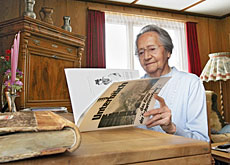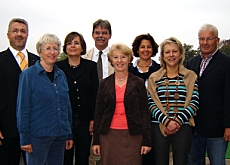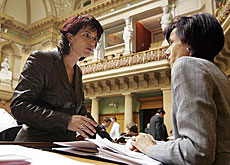Swiss remember first step in women’s suffrage

Saturday marked 50 years since women voted for the very first time in Switzerland – in a local ballot in the tiny mountain village of Unterbäch.
The move, although controversial at the time, was hailed as a big step for women’s suffrage. But a recent study shows that Swiss women – who obtained the vote at the federal level in 1971 – are not always exercising this right.
Although officially still not allowed to vote, more than 30 women went to the polls on March 3, 1957, in Unterbäch, in southwesten Switzerland.
They were deciding whether civil protection – assistance and support for the local population, such as protecting cultural property – should be made obligatory for women.
“I was at first not totally enthusiastic when my husband had the idea that women should vote on obligatory civil protection for women,” recalls 87-year-old Katharina Zenhäusern, the wife of the then village mayor.
But her husband, the late Paul Zenhäusern, and Peter von Roten, who was married to feminist writer Iris von Roten, thought otherwise, saying that decency dictated that men should not behave as “all powerful guardians”.
The government and local authorities declared the ballot illegal and Unterbäch itself was sharply divided. Women who voted were subjected to insults as they entered the voting booth.
“It needed courage,” said Zenhäusern, who was the first to cast a ballot. Only a further 32 of the 84 eligible women followed suit.
The proposal was rejected – as it was on a national level. However, the Unterbäch vote provoked huge interest in Switzerland and abroad. Even the New York Times wrote about it.
Important sign
“It was an important sign for the whole of Switzerland because nearly in all other European countries the right to vote for women had already been introduced, but in Switzerland this only came in 1971,” Radical party parliamentarian Christa Markwalder told swissinfo.
Unterbäch commemorated the anniversary on Saturday. Among those attending the celebrations were Elisabeth Kopp and Ruth Dreifuss, the first two women who joined the cabinet in 1984 and 1993 respectively. Dreifuss called for the fight for equality to continue.
However, despite the progress made since 1957, a recent study has shown a worrying trend towards female political apathy.
According to data from the Swiss Electoral Studies (Selects) research project, the percentage of women compared with men voting in national polls has dropped markedly.
In 1995, 45 per cent of men and 39 per cent of women voted – a difference of six per cent. By 2003, 54 per cent of men and 38 per cent of women voted – a gap of 16 per cent.
This goes against the trend in other European countries where the statistics have mostly evened out.
Vote after-effects?
One explanation is that older Swiss women have not developed the habit of voting because they obtained suffrage relatively late. This habit may have been passed on to their daughters.
Markwalder, who is 31, said she was surprised by the result, as the rise in women’s education levels would normally be accompanied by more political participation.
However, she was not sure that the late vote was fully to blame, especially as women were quick to catch up and now make up one quarter of all members of parliament.
She believes a reason could be the recent polarisation in politics.
“Politics is quite a hard business, you’re sometimes personally attacked or there are political fights and I think women are interested in concrete political questions but not so much in the whole theatre all around it,” she told swissinfo.
Markwalder believes the answer lies in mobilising women to participate in politics at grassroots level.
Raising women’s profile in politics – such as her party will be doing for the upcoming elections – is also a solution.
“For women it is important to have some role models, so you see that women are successful in politics and also self-confident enough to be in the local, cantonal or national government,” she said.
swissinfo, Isobel Leybold-Johnson
Unterbäch’s slogan is “Unterbäch the Swiss woman’s Rütli”, in reference to the meadow where the Swiss founding fathers swore their oath.
The village marked the vote’s 50th anniversary with a day of celebrations on Saturday.
It has invited Swiss President Micheline Calmy-Rey and other female politicians to an alternative women’s national day on August 1.
After the Unterbäch vote, several cantons gradually followed suit and in the 1960s women started occupying more important positions in local parliaments and governments. In 1968 Geneva, then the country’s third largest city, had a woman mayor – but she still couldn’t vote in federal elections.
On February 7, 1971 Swiss men finally voted to give women full federal voting rights, by a two-thirds majority.
Nowadays women make up around 25 per cent of parliamentarians and there are two women in the cabinet.
But critics argue there is still some way to go before there is full political equality.

In compliance with the JTI standards
More: SWI swissinfo.ch certified by the Journalism Trust Initiative



You can find an overview of ongoing debates with our journalists here. Please join us!
If you want to start a conversation about a topic raised in this article or want to report factual errors, email us at english@swissinfo.ch.